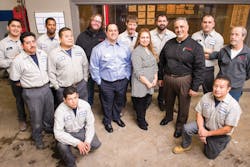North America’s largest network of independently owned collision repair shops includes more than 440 facilities in 31 states and 10 Canadian provinces. The criteria for just being a part of the CARSTAR network is strict. To be named the best is no small feat.
Lou Scola knows this, which is why he still gets emotional talking about his family-run shop’s achievement of franchisee of the year, CARSTAR’s highest honor, in 2014.
CARSTAR Scola’s Collision Center
Location: Brookfield, Ill.
Size: 13,750 square feet
Staff: 14 (5 office management staff, 2 body techs, 2 DFR techs, 2 paint staff, 2 porters and 1 buffer)
Cars per month: 110–130
Annual revenue: $2.8 million
“There’s nothing more rewarding than having your peers recognize you,” says the second-generation repairer, who in 2004, along with brother, Anthony, took over the shop their father founded 25 years ago.
CARSTAR Scola’s Collision Center in Brookfield, Ill., has all of the numbers to validate the recognition. Cycle time is below six days (down from 9–11 days a year ago), touch time is above four hours (up from about 2.3–3 hours the previous year). The shop generates $2.8 million a year from 110–130 repairs a month with a staff of 14 working out of 13,750 square feet. Its EBITDA (earnings before interest, taxes, depreciation, and amortization) rose from 2 percent to 13 percent in the last year. CSI scores are consistently above 90 percent.
The impressive metrics go on and on, but there’s only one reason for all of them, Lou says: Culture.
One for All
Derek Alexander, lead DFR technician and “designated champion” at Scola’s, is surprisingly chipper on a busy Monday morning. He can take a phone call and know that his three fellow technicians—whom he works with on a team-pay system—will be able to keep jobs moving. They are all invested in completing each job properly and quickly, for their own benefit and the greater success of the company.
“It’s like a baseball team. Everyone needs to be on the team,” Alexander says. “Everyone has a responsibility and they stick to it. Everyone is held accountable and we all help each other.”
Moving technicians and paint staff into a team system was a change Lou and Anthony made as part of their shop’s advancement through CARSTAR’s EDGE Performance program (which now integrates BASF’s Advanced Process Solutions program), a five-tier system designed to help shops achieve consistently high KPIs. Scola’s is the only CARSTAR shop currently operating at tier three. The move to a team system alone nearly doubled touch time within two months and helped foster an environment in which employees are motivated to help each other, as each team’s total hours are split evenly.
The first team consists of two disassemble for repair (DFR) techs and two A-level techs. The second includes one painter and one prepper.
“I remember one day vividly that three cars were waiting to come out of paint and Team 1 sent a B tech over to help prep vehicles so they could get through paint,” Lou says. “They did that themselves. That’s what I mean by the culture.”
Buying In
Making significant operational changes, such as moving to a team system, often isn’t easy at a shop. Getting buy-in from staff is essential, Lou says. His shop has done that by making employees part of the decision-making process. The shop’s lengthy list of standard operating procedures were developed based on collective staff experiences and best practices.
Even things like equipment placement are decided with heavy staff input to ensure optimal efficiency on the shop floor.
“We’re included in decisions,” Alexander says. “That makes it easier to come to work on a Monday. Knowing that [the owners] actually care what we think and how we want to do things.”
Anthony says he and his brother have gone so far as to remove themselves from some of the company’s regular meetings. Once every two months, Alexander leads what is jokingly referred to as a “what’s dumb around here” meeting in which staff discuss challenges and ways to improve.
The Scolas are then debriefed on any process changes that staff wants to make, and provide the final stamp of approval.
Anthony says giving staff ownership over processes creates a far more relaxed environment that is fun to work in, as opposed to one in which the bosses are imposing changes and barking orders.
Garrett Cary, the shop’s parts manager for the last decade, says the culture instills great pride in the work each employees does.
“Lou and Tony have a drive to be the best at what we’re doing and they instill that in the people around them, and put the right people in places to do it,” Cary says. “It takes committed people who are able to accept change around them.”
When BASF recommended doubling the shop’s amount of parts carts from 15 to 30, enlarging the parts room, improving access, and implementing new procedures such as pre-ordering and mirror-matching, Cary embraced it.
“I could have been real negative about it and said I don’t need this stuff, but I took it as a positive thing and went along with the program,” he says. “Now the parts room is more organized and everything is a lot easier to manage so it was a good thing.”
Lou says the shop still hasn’t hit it’s full potential. He expects to exceed $3 million in revenue next year if everyone keeps moving in the same direction.
He views his business as a true family operation, even hosting holiday events for staff at his home. Without that unity, he says, none of the success they’ve experienced would have been possible.
“All of these people grew up with us in the industry,” he says of his staff. “Our loyalty and all of our efforts together are what developed a culture to bring us to this point.”
